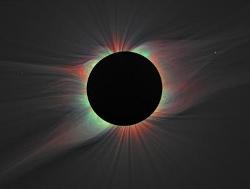Jan 5 2010
Solar physicists attempting to unlock the mysteries of the solar corona have found another piece of the puzzle by observing the sun's outer atmosphere during eclipses.
 This image of the solar corona contains a color overlay of the emission from highly ionized iron lines and white light taken of the 2008 eclipse
This image of the solar corona contains a color overlay of the emission from highly ionized iron lines and white light taken of the 2008 eclipse
Ground-based observations reveal the first images of the solar corona in the near-infrared emission line of highly ionized iron, or Fe XI 789.2 nm. The observations were taken during total solar eclipses in 2006, 2008, and 2009 by astrophysicist Adrian Daw of NASA's Goddard Space Flight Center in Greenbelt, Md., with an international team of scientists led by Shadia Habbal from the University of Hawaii's Institute for Astronomy (IfA).
"The first image of the corona in Fe XI 789.2 nm was taken during the total solar eclipse of March 29, 2006," said Daw.
The images revealed some surprises. Most notably, that the emission extends out at least three solar radii—that's one-and-a-half times the sun's width at its equator, or middle—above the surface of the sun, and that there are localized regions of enhanced density for these iron ions.
Combined with observations of other iron charge states, the observations yield the two-dimensional distribution of electron temperature and charge-state measurements for the first time, and establish the first direct link between the distribution of charge states in the corona and in interplanetary space. "These are the first such maps of the 2-D distribution of coronal electron temperature and ion charge state," said Daw.
Mapping the distribution of electron temperature and iron charge states in the corona with total solar eclipse observations represents an important step in understanding the solar corona and how space weather impacts Earth.